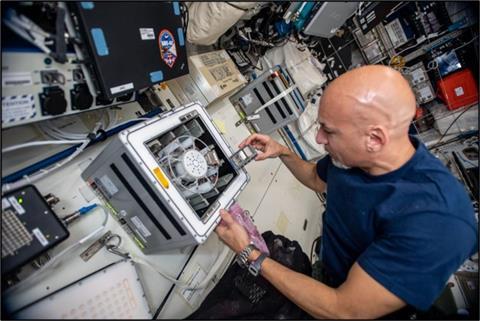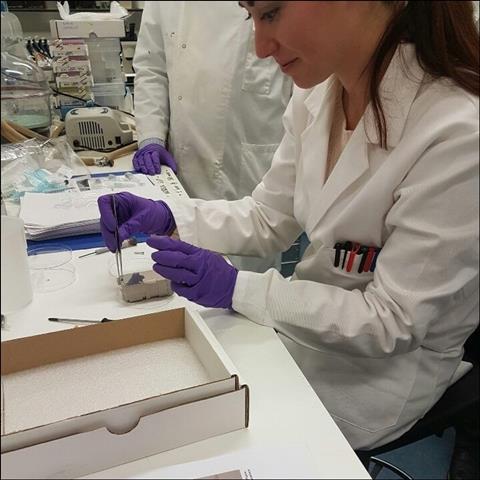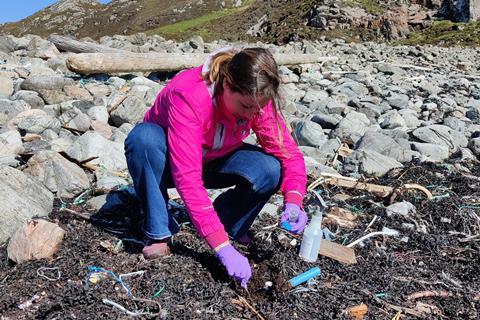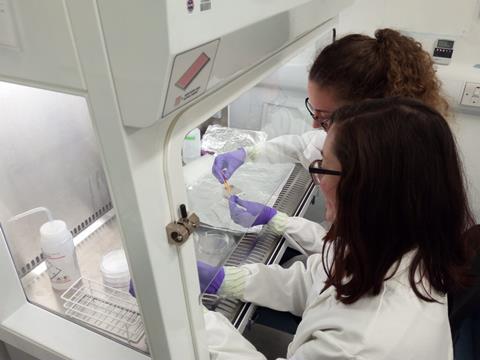The Space Microbiology Group studies how microorganisms behave in space conditions, using tools such as microbiology, molecular biology, system biology and geomicrobiology to learn how new biotechnologies could be applied to space, as co-director Rosa Santomartino explains.
My name is Rosa Santomartino, co-director of the UK Centre for Astrobiology at the University of Edinburgh, and incoming assistant professor at Cornell University (starting May 2025). My research group focuses on developing biotechnologies to enable sustainable human space exploration.

Established in 2022 at the UK Centre for Astrobiology with the support of a Leverhulme Early Career Fellowship, the group will transition to the Department of Biology and Environmental Engineering at Cornell University in 2025.
Ideas from orbit
The idea for this research emerged during my postdoctoral work on two space microbiology experiments, BioRock and BioAsteroid, conducted aboard the International Space Station between 2019 and 2021. The PI was Prof Charles S. Cockell.
These projects investigated whether microbes like bacteria and fungi could be used for biomining - a process widely employed on Earth - to extract metals like rare earth elements and palladium, under space conditions.

While working on these experiments, I began exploring other potential space applications of biotechnology. This question is critical because the distances to the Moon or Mars pose enormous logistical challenges.
A trip to Mars, for example, takes at least six months. During such a journey, there is no opportunity to restock supplies (imagine travelling for six months without the possibility of stopping for fuel, grocery etc!), making it impractical to carry everything needed for survival, such as oxygen, water, and food.
Resources and waste
To address this, space missions must minimize payloads by producing essential resources en route or at the destination. Biotechnologies like biomining could play a vital role in this.

However, I became increasingly interested in another challenge: managing waste in space. Space exploration inevitably generates waste, and effectively recycling it could further reduce payload needs while enhancing sustainability. Microbes offer a promising solution, as they can serve as “miniature factories” capable of performing a wide range of tasks, from producing useful compounds to breaking down and recycling waste materials.
The key challenge lies in understanding how microbes will function in the harsh conditions of space, such as low gravity and high radiation. Will they continue to perform as expected, die, stop working, or even become hazardous to the crew? My research group focuses on answering these questions while developing biotechnologies to address waste management in space settings.
Implications for Earth
Another crucial aspect of our work is its potential to benefit Earth. Critics often ask why we should prioritize space sustainability when there are pressing issues on Earth. I believe this is a valid concern, but space exploration has historically driven advancements that are now integral to daily life, such as GPS, CT scanning, artificial limbs, and laptops.

By solving challenges with limited resources in space, we can create innovations that improve sustainability on Earth. For example, highly efficient biotechnologies for waste recycling in space could significantly enhance terrestrial circular economies. Our research has already demonstrated that space biomining is feasible and revealed that space conditions influence how microbes interact with surfaces and degrade waste materials, such as plastics.
We have also conducted fieldwork on Scottish shores, collecting plastic waste to study the associated microbes. This work not only advances our understanding of pollution but also identifies new microbes with potential for plastic degradation and recycling. This synergy between space and Earth research exemplifies how both fields can mutually benefit.
Scaling up
The greatest challenges in our work include the complexity of developing scalable biotechnologies and the limited access to real-space facilities for testing. Scaling from bench-top experiments to industrial applications requires collaboration across disciplines, including engineering, physics, geology, and space agencies.

While testing opportunities in space are limited, advancements in space simulators provide a valuable alternative. Collaboration remains essential to overcoming these barriers, and fostering partnerships is key to my approach.
Looking ahead, I aim to create a multidisciplinary hub that integrates biotechnologies for synthetic waste degradation and recycling into a closed-loop system. This hub would develop interconnected technologies to reduce waste generation and promote sustainability, benefiting both space exploration and Earth. By leveraging collaboration and innovation, I hope to transform the way we think about resource management in any environments, being it either on Earth or space.
Find out more about the Space Microbiology Group.







No comments yet